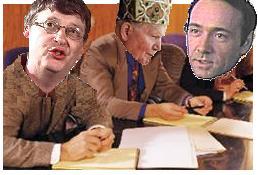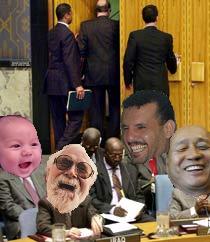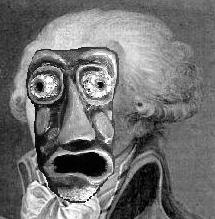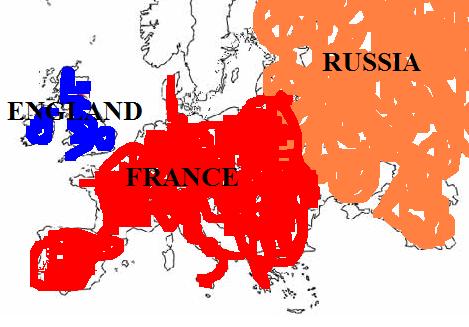
The first meeting. Bill Gates thinks his ideas matter. WRONG!
In 1789, the same year that Washington and the gang were writing down the U.S. Constitution with a quill and ink on four pieces of dried animal skin, things got funky in France. Louis XVI realized that he was in trouble. He had a mondo national debt and an extremely whack tax code (sound familiar?). He and his finance minister got folks from the Church, the nobility, and the middle class to meet together for the Estates-General. Think of it as a conference between the pope, Bill Gates, and Average Joe Suburbanite.

Although the first two estates represented only 2% of the French population, they held 66% of the voting power at the meeting. Needless to say, the Third Estate realized they'd been shafted. So they convinced the other two to join 'em in taking control of the country from the royalty. When Louis realized what was going on, he closed the hall they met in, so they met in the royal tennis court instead. (Some viewed this as a bad move, since some people were trying to play in there. Many delegates were knocked out by flying tennis balls.) There, they all took an oath which declared the rock would not stop until a constitution stood atop France.
Soon, even the nobles joined in the fray, and the military started showing up in Paris and Versailles. The whole gang went to the Bastille prison on July 14 and pretty much owned. They let seven prisoners free, but pretty much everyone else got dead. To avoid getting dead too, Louis joined the crowds and a bunch of pansy nobles ran away to plot retaking the country from the mob. On August 4, anything or anyone who had any privilege whatsoever had it taken from them. Everyone had "equal" status under the law.
This solidarity among the Assembly didn't last very long, though. Conservatives and former nobles/clergy opposed the revolution. Some middle class dudes led the liberal masses. Luckily, they all found common ground in respecting freedom and passed the Declaration of the Rights of Man and of the Citizen, which was basically the U.S. Declaration of Independence renamed. Plagiarism didn't exist back then, or else France would have failed the paper.

Anyway, they finally got around to writing a constitution with which to perpetuate the good times. Most of the first two estates pulled for a legislature led by nobles, but the third estate said, "Siddown!" and made it a unicameral. The king could slow down a law's passage, but not stop it. To pay off still growing budget deficits, the Assembly confiscated all of the Church's land and sold it. It also made vows to the Church null and void and made the Church an official government agency. Some ticked priests said heck no and walked out of the meeting. They were probably laughed at.

On July 14, 1790, everyone, including the king and his relatives, partied to celebrate the owning of the Bastille a year earlier. Some people tried to stop the revolution, but they all failed. The legislature gave the king power to declare war with their approval, much as the U.S. Congress did until it gave up this constitutional provision to the Presidency in the 1950s. Individuals got licenses to do things like be a barber or a doctor simply by buying one from the government. Many bad haircuts and messy amputations occured because of this. Strikes were made illegal, as were unions. Louis XVI tried to get away, but got caught.
The Assembly had enough and dismissed the king as ruler of France, holding him under arrest. They all crowded into the field in Paris called the Champ-de-Mars and started signing a petition to make Louis a constitutional monarch. Lafayette's National Gaurd saw the dangers of signing petitions and shot up to fifty people. Next, a bunch of other European bigshots issued a Declaration of Pilnitz, which said if the people didn't give full control back to Louis and calm down, they'd beat up the Revolution. In response, the legislaure sent Louis a constitution, which he enthusiastically signed.
Once a new assembly was elected, they decided to expand the brouhaha by attacking Austria. A few months later, some Jacobin radicals backed by the Paris Commune kidnapped the king and queen for themselves. Afeared of what the Commune might do if changes weren't enacted, the Assembly wrote a new constitution in September 1792 and made France a republic. A National Convention was the new legis and the Committee on Public Safety was the exec branch. The Girondins, the middle-grounders between Feuillants who pushed for a return to monarchy and the crazy Jacobins who wanted nothing less than all-out democracy, took control of both branches.
The calm didn't last very long, though. The Jacobins soon enough decided that things were too stagnant, so they executed the king in January and the queen in October. When the war with Austria started turning seriously sour, they managed to wrest control of the government. One seriously insane Jacobin named Maximilien Robespierre got in charge of the Committee on Public Safety. I don't think his knowledge of vocabulary was very good, because he seemed to think that "public safety" meant "guillotine everybody." All you had to do was give Robespierre a funny look to get sent to your death. Even being overly excited about the Revolution was a punishable offense. Everyone walked around with a grimace/smile on their faces to avoid his wrath.
Robespierre took it too far when he started to kill his fellow Jacobins. They threw him out of office and onto the street, where he spent most of his time begging for bread and scaring little kids just for kicks. This only lasted until a more moderate Convention got elected, though, because they cut off his head to end his Reign of Terror once and for all. They uploaded the 1792 Constitution on their computer and rewrote it, calling it the "Constitution of the Year III" (France had a cool, spankin'-new calender) or "Constitution v 3.0." After a popular vote, it got started on September 26, 1795.
 |
| 
The Directory it created was a bicameral legislature, their first. Congress sent a letter saying "told you so," which arrived a year after the Directory's first meeting thanks to overseas shipping times (they sent it economy-class.) The Directory used the army to make remaining insanes and some sissy royalists shut up. One general became increasingly effective. His name was Napoleon Bonaparte. Scared that he might get too popular with the peoples, the Directory sent Bonaparte to Egypt, where he used the Sphynx's nose as a target for his troops to practice on. He also found the Rosetta Stone, which gave him the power to shoot lasers out of his eyes and breathe fire through his nostrils.

Soon enough, he bored of Egypt and returned to France, where in 1789, a decade after France had begun its path to coolness, he became dictator. Following this announcement, he proceeded to reform everything from the tax system to instituting the metric system as the new system of measurement. Sometimes I wish American politicians would follow his example in this matter. After forcing Austria to give him some land in 1801, Napoleon lost a ton of money trying to capture Santo Domingo, where a hardcore slave named Toussaint L'Overture beat down the invading Frenchmen. Bonaparte had to sell that huge chunk of land named the Louisiana Purchase to the U.S. for discount prices in order to make up for his losses.
Bonaparte bored of the bureaucrazy of the republic in 1804 and made the pope crown him Emperor of France and King of Italy so he could do whatever he felt like without having to ask other people. He therefore teamed up with Spain to take on Britain's Navy on October 21, 1805, but Horatio Nelson stepped it up hard at Trafalgar and the Royal Fleet continued to dominate the waters. Since he couldn't beat Britain, Napoleon proceeded to take over Germany and split the rest of Europe with Russian czar Alexander I. In 1812 he changed his mind and tried to take over Russia too. Unfortunately, he underestimated the weather (soldiers were mistakenly provided with swim trunks rather than gloves) and his army of 600,000 dwindled to 10,000 before he got away.

A year later, realizing that this was their only chance, Europe jumped him at the Battle of Leipzig and sent him to an island called Elba. Less than a year after arriving there, Napoleon got bored/worried about rumors of being shipped to the Atlantic and escaped somehow. When he returned to France, Louis XVIII sent troops to capture his haughty self. Napoleon told the soldiers to shoot him if they wanted to. By the time he arrived in Paris a few weeks later, he was accompanied by 140,000 regular army troops and 200,000 volunteers. Not bad for a former dictator who had been in exile for a year.
After one-hundred days of more funtime, the Duke of Wellington beat him for good and sent him to the isle of St. Helena. There he died of arsenic poisoning. His last words were, "France, the Army, Josephine." With Napoleon's death, France calmed down and became a stable country, undergoing minimal revolution since. France has, undoubtedly, one of the craziest developmental histories in the world. It's a shame that they deteroriated into the land of sissies that it is now, losing every major military conflict (even getting beat by Algerians.) However, though the France of today is a pitiful sight, the France of yesteryear is a beacon of rock. I salute it.
Heck yeah! Mexico goes through about 100 rulers in twice as many years! (that means 200!)
And now, presenting more [Very] Critical Reviews...